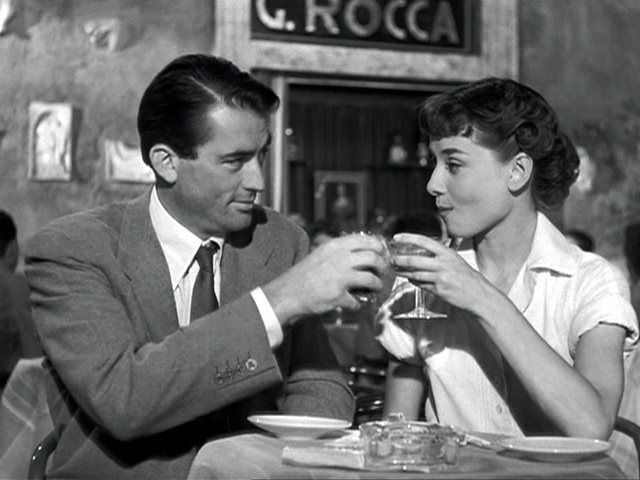Roman Holiday is one of my favourite movies, not only because it’s a moving comedic romance (one of the few romantic comedies I enjoy) but because it touches upon a timeless issue in journalism: what stories are worth reporting? It gets more complex than simply bad or boring stories versus good and entertaining ones. It’s precisely the latter category that poses ethical problems for the self-reflective media professional, who should always be asking herself or himself: what constitutes a worthwhile story? Will publishing the piece harm the source or someone else in any way? Even if the story is technically of human interest, and would almost certainly gain lots of attention and viewership, is it truly worth the potential personal harm and hurt (as well as possible wider ramifications)? This is the question lying beneath the slice-of-life, easygoing, and gentle mood and ambience of Roman Holiday, and indeed defines the relationship between Gregory Peck’s Joe Bradley and Audrey Hepburn’s Princess Ann.
The Buddhist principle of Right Speech appreciates the nuances around communication. The Buddha defined Right Speech as: “abstinence from false speech, abstinence from malicious speech, abstinence from harsh speech, and abstinence from idle chatter.” Idle chatter, gossip, and rumour-spreading are part and parcel of the tabloids that endlessly pursue celebrities and figures of glamour and allure. When it comes to personages of royal heritage, however, public perception of a country’s ruling class could be affected by careless coverage, as the tragedy of Princess Diana’s death in 1997 and the revolting media furore that dogged the British royals demonstrated. The plot of Roman Holiday has resonances of such moral dilemmas that the press seemed to ignore or overlook throughout Diana’s life, because gossip stories about the Windsors’ turbulent love lives garnered voracious readerships.
In Roman Holiday, Joe is a cynical reporter for American News Service in Rome. After a drunk Princess Ann accidentally ends up at his apartment, Joe decides, with his editor Hennessy and photographer Irving, to nab a once-in-a-lifetime opportunity for an intimate interview by taking her around the city under a different identity. Obviously, Joe’s hesitation and eventual decision not to publish anything was influenced by his blossoming affections for Ann. One might say he made a biased choice: as Irving would later reprimand him: “She’s fair game, Joe! It’s always open season on princesses. You must be out of your mind!”

Yet Ann’s overnight and day-long absence from her duties (and privileged yet corseted lifestyle) was already arousing diplomatic and public concern. It was at the final scene of the press conference with Ann (who had returned to her courtiers) where the full impact of Joe’s choice to protect Ann’s privacy could be felt: “I have every faith in it [the friendship among nations], as I have faith in relations between people,” she said to the gathered reporters, but looking directly at Joe.
“May I say,” replied Joe, “speaking from my own press service, we believe that Your Highness’s faith will not be unjustified.” Her secret was safe with him. There would be no breaking news, no exclusive interview in a newspaper or magazine. “Relations between people” were far more important. Even Irving, who has come round to Joe’s perspective, gives up the opportunity to sell the photographs he has taken of Ann’s day out in Rome to give them to her, as a memento of her very special, and perhaps only, day as a commoner.
For Joe and Irving, what was initially a story that would fetch lots of money and readers turned into something much more beautiful: a day during which a princess became just another young lady enjoying coffee, ice cream, dancing, and a kiss with a handsome journalist. While the feelings between Joe and Ann could never manifest into a conventional relationship, for Joe this wasn’t just about them. “I have no story,” he insists to his befuddled editor, which can be read in two ways: that he was unable to write up the piece, but also that he doesn’t intend to give his editor anything that would give Ann unwanted public scrutiny. “There is no story,” he repeats to Irving, “at least not as far as I’m concerned.” This scene is the exercise of Right Speech: a moral choice, made by an agent of civic discourse and information dissemination (a journalist), to protect someone who desperately needs it.
Members of the press see themselves as storytellers. Yet it’s easy for the hungry correspondent or writer to forget that they are moral agents moving and acting within the world as much as they are observers of the world. As moral agents, journalists cannot help but make ethical choices just like any other thoughtful, reflective individual. Beyond the romance and heartache, Roman Holiday is a story about the choices a down-on-his-luck correspondent makes to protect an innocent princess. Where his pen might usually be used for good or at least neutral results, his pen here might harm. There is only one choice for a commoner in this situation: to let go.

